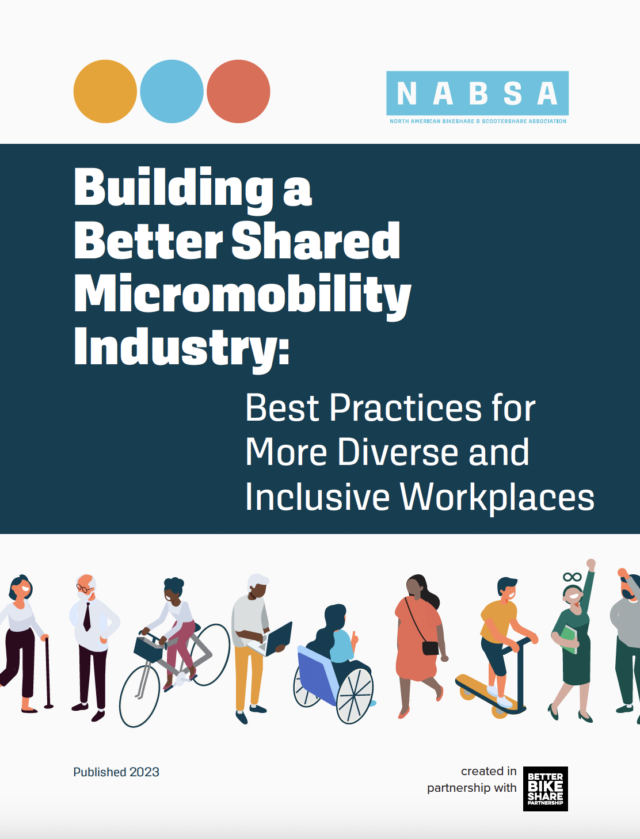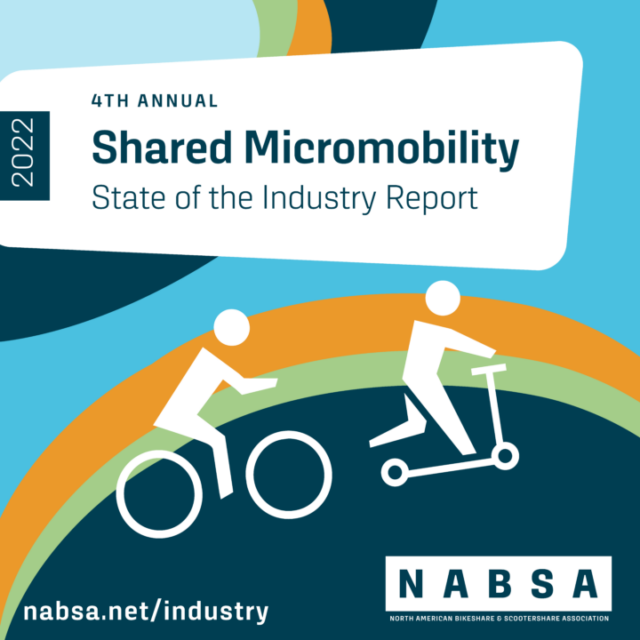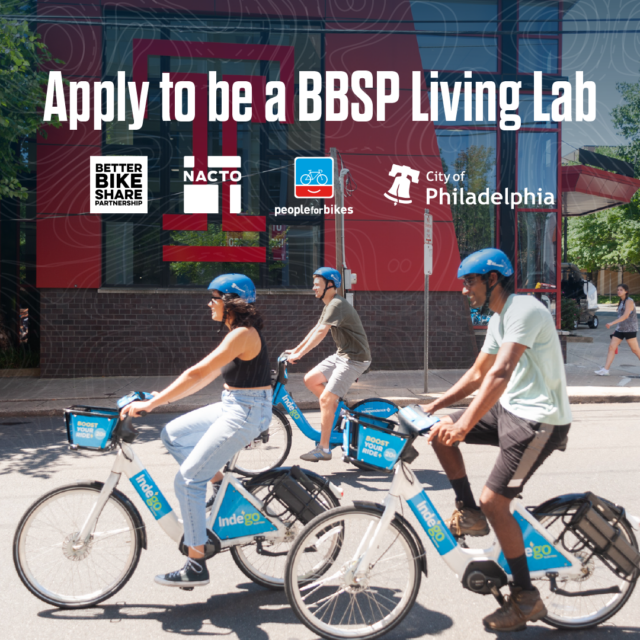Best Practices for More Diverse and Inclusive Workplaces
by Kiran Herbert, Communications Manager
September 26, 2023
This comprehensive NABSA toolkit offers guidance on fostering a workplace culture ingrained with the values of diversity, equity, inclusion, and belonging.

Last week, NABSA released an update to its 2019 Workforce Diversity Toolkit. Created in collaboration with the Better Bike Share Partnership, the original toolkit was designed to help the shared micromobility industry take the necessary first steps toward building a more diverse industry at all levels of leadership and operations.
The new toolkit has been updated to include lessons learned from the last four years. “Building a Better Shared Micromobility Industry: Best Practices for More Diverse and Inclusive Workplaces” offers best practices for cultivating a diverse workplace and fostering a culture ingrained with the values of diversity, equity, inclusion, and belonging (DEIB). While the case studies focus on the shared micromobility industry, this guide is relevant to any organization that wants to improve using DEIB principles.
Sections of the toolkit include:
- Recruitment and Outreach
- Hiring
- Retention
- Leadership Accountability
- Workplace Culture
- Professional Development
- Tracking Progress and Measuring Impact
Over the past few years, the shared micromobility landscape has undergone significant transformations. According to NABSA’s 2022 State of Industry Report, at least one shared micromobility system exists in approximately 401 cities across North America, demonstrating the increasing ubiquity of our industry. In the wake of a challenging 2020, ridership in 2022 across North America returned to pre-pandemic levels, underscoring the resilience and vitality of bike share and scooter share.
However, alongside these successes, there is room for improvement. Although the representation of Black, Indigenous, and people of color among shared micromobility users has increased in past years, NABSA’s data reveals that white men continue to be over-represented. Additionally, user demographics tend to be skewed toward higher-income earners and those under 44 years old. In 2022, 56% of agencies and operators reported that their staff is representative of the population being served, meaning the industry is skewed white and male. The information gathered underscores the need for concerted efforts to ensure shared micromobility users and workplaces reflect the diverse communities they aim to serve.
This toolkit seeks to spotlight the challenges and opportunities concerning workforce diversity, equity, inclusion, and belonging within shared micromobility. Intended for a wide audience, the toolkit includes a glossary of terms to help anyone — from industry veterans to those just entering the field — get started on their DEIB journey. The insights and strategies offered recognize the diversity of sectors and organizations in shared micromobility and apply to various geographies and contexts, recognizing the global relevance of our industry’s mission.
Each toolkit section is enriched with action steps and case studies to provide tangible strategies to build a more diverse team and promote a more equitable organization. Users can skip from section to section, using the featured resources, or take in the toolkit holistically and create a baseline for progress using the self-assessments featured throughout.
Here’s a guide on how to effectively navigate and use the toolkit:
Recruitment and Outreach
This section delves into the best practices for attracting a diverse pool of candidates. It is designed to help your organization broaden its outreach and draw in candidates from various backgrounds and experiences.
Hiring
After successfully recruiting diverse candidates, the next step is hiring. This segment focuses on creating an equitable hiring process, providing tips on crafting inclusive job descriptions, conducting unbiased interviews, and making fair decisions.
Retention
Retaining a diverse workforce and cultivating a sense of belonging can be even more complex than recruiting and hiring. This section provides strategies for retaining diverse talent, including fostering an inclusive and supportive work environment, promoting work-life balance, and ensuring equitable access to opportunities and resources.
Leadership Accountability
In the shared micromobility industry, leadership is essential for establishing and embodying DEIB principles, setting the tone for workplace culture, and fostering an environment where diversity is valued and everyone feels a sense of belonging. Leaders are responsible for actively diversifying the workforce, ensuring equitable opportunities, and continually evaluating and adjusting DEIB strategies.
Workplace Culture
Workplace culture significantly influences staff satisfaction, performance, and retention. This segment will guide you in cultivating an inclusive, respectful, and welcoming workplace culture that values diversity and fosters a sense of belonging.
Professional Development
Professional development opportunities are essential for employees’ personal growth and career advancement, and in the context of DEIB, they ensure all individuals, regardless of their background, have equal opportunities to succeed. In the shared micromobility industry, these opportunities can include specialized training on new technologies or trends, which can, in turn, foster a more skilled, diverse workforce and enhance an organization’s adaptability in our ever-evolving industry.
Tracking Progress and Measuring Impact
The final section deals with accountability. Here, you’ll learn how to keep your organization accountable for its DEIB commitments. This section includes strategies for regularly monitoring and assessing DEIB efforts and the importance of transparent communication.
Download the Toolkit
While we strive to provide comprehensive and up-to-date information, this toolkit should be a guide rather than an exhaustive resource. The rapidly evolving nature of the shared micromobility industry means that while this toolkit provides a strong starting point, continuous learning, and adaptation are integral to achieving lasting success.
Save the date for November 2, 2023, when NABSA will hold a webinar on the updated toolkit. Presenters will include members of organizations featured in the toolkit’s case studies.



